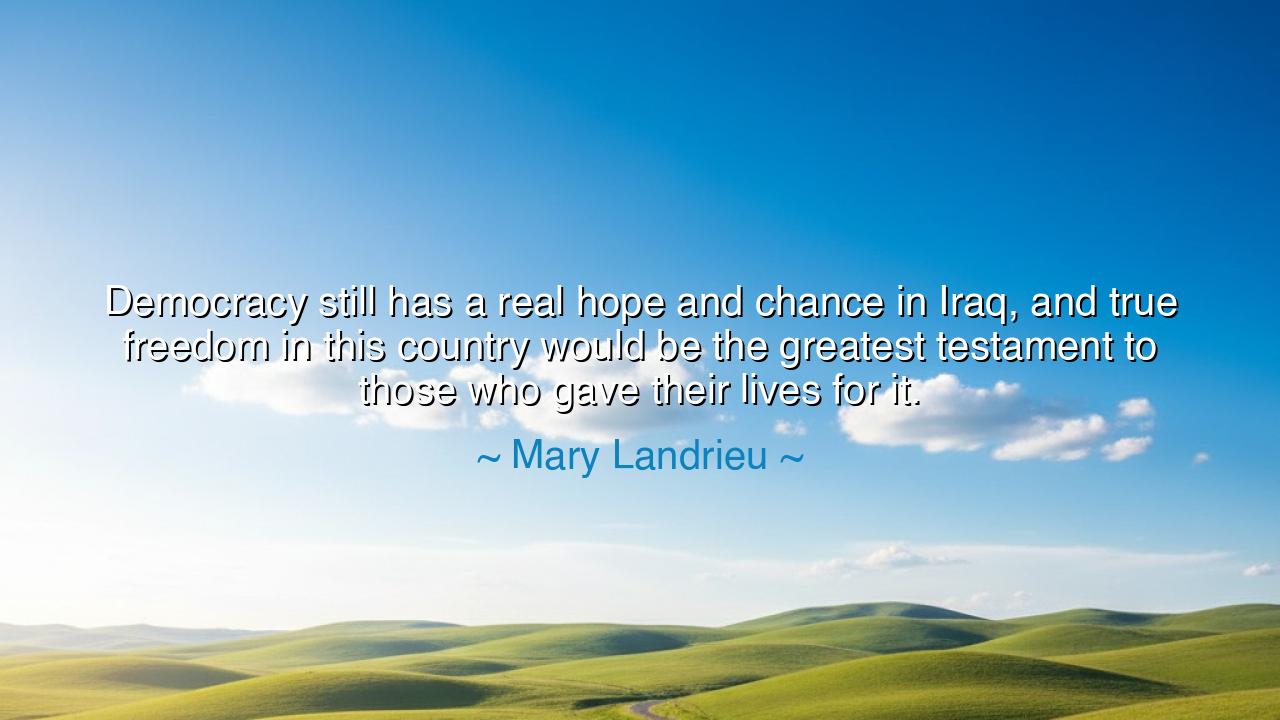
Democracy still has a real hope and chance in Iraq, and true
Democracy still has a real hope and chance in Iraq, and true freedom in this country would be the greatest testament to those who gave their lives for it.






In the moving words of Mary Landrieu, "Democracy still has a real hope and chance in Iraq, and true freedom in this country would be the greatest testament to those who gave their lives for it," we find a reflection on the transformative power of freedom and democracy. Landrieu speaks of Iraq as a nation at the crossroads, where the struggle for freedom and self-determination is not just an abstract ideal but a living reality fought for by many, even at the cost of their lives. This statement reminds us that the very foundation of democracy—the right to self-rule and the pursuit of justice—is never given freely but is earned through sacrifice. The true test of any democracy, Landrieu suggests, lies in its survival and the fruition of the sacrifices made by those who fought for it, whether in Iraq or anywhere else in the world.
The ancient Greeks, the founders of democracy in its most famous form, understood the weight of such a task. Pericles, in his Funeral Oration, famously stated that democracy, though fragile, was a system in which the people had the power to shape their own lives. Yet, he also recognized that this system was not without its costs. In the heat of battle, in the very act of defending freedom, many soldiers gave their lives for the promise of a better future. Pericles honored these sacrifices, understanding that the beauty of democracy lay not just in the freedoms it granted, but in the sacrifice it demanded from its citizens. Landrieu’s words echo this sentiment, acknowledging that the hope for a free, democratic Iraq rests on the enduring spirit of those who gave everything for the cause of liberty.
This theme of sacrifice and freedom also emerges in the Roman Republic, where the concept of civic duty was of paramount importance. Cicero, the great orator and statesman, believed that the health of a republic could not be secured without the participation and sacrifice of its citizens. He said, “The safety of the people shall be the highest law,” emphasizing that true freedom requires active engagement and, at times, personal cost. In the case of Iraq, as in the Roman Republic, freedom and democracy are not born out of mere ideals but out of the blood, sweat, and tears of those willing to fight for them. The freedom that Landrieu speaks of, though still in the process of becoming, is one built on the shoulders of those who laid down their lives in pursuit of it.
Consider the American Revolution, where men and women sacrificed everything to establish a new nation founded on the ideals of liberty and democracy. George Washington, despite facing incredible odds, led his troops to victory, understanding that the future of the United States depended not just on military success, but on the sacrifices of the people involved. His leadership was built on the belief that true freedom could not be achieved without the cost of struggle and sacrifice. The birth of this nation was not instantaneous, but was built over time through the bloodshed of those who understood that democracy is not a gift, but a treasure that must be constantly defended. In this light, freedom in Iraq, as Landrieu envisions, is an extension of this noble tradition.
Landrieu’s words also call attention to the idea that true freedom and democracy are not only political structures, but living, breathing entities that grow and change through the active participation of a free people. The struggle for democracy is not a singular moment in time but an ongoing process that demands vigilance, engagement, and an unwavering commitment to the principles of justice, equality, and self-determination. As Nelson Mandela once said, "Freedom is not a mere absence of oppression, but the presence of justice." Democracy requires the courage to fight for it, the strength to sustain it, and the humility to understand that it is always a work in progress. Iraq, like all nations, must continuously strive to live up to the ideals of freedom and democracy, even as it endures the challenges of its tumultuous journey.
The lesson here is clear: freedom is never simply granted; it is earned through sacrifice, courage, and the steadfast will of those willing to fight for it. Just as ancient heroes faced tremendous odds in defense of their nations, so too do the people of Iraq face the monumental challenge of building a democratic society. Landrieu’s words remind us that we must not take freedom for granted, nor assume that the struggles of the past are irrelevant to the struggles of the present. The sacrifices of those who have come before us must fuel our resolve to build and protect a world of justice and freedom for all.
Thus, the practical action we must take is to actively engage in the process of democracy. Vote, speak out, and fight for justice wherever it is needed. We must remain ever vigilant in the defense of the freedoms we enjoy, understanding that they are not inherent but must be continually upheld by each generation. Like those who fought for freedom in Iraq, America, and throughout history, we must commit ourselves to the values of equality, justice, and liberty, and ensure that these ideals are passed on to the generations that follow.






AAdministratorAdministrator
Welcome, honored guests. Please leave a comment, we will respond soon